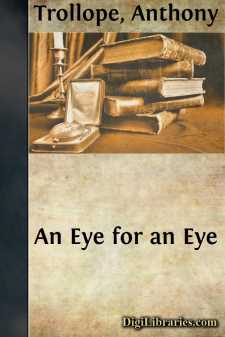Categories
- Antiques & Collectibles 13
- Architecture 36
- Art 48
- Bibles 22
- Biography & Autobiography 813
- Body, Mind & Spirit 142
- Business & Economics 28
- Children's Books 16
- Children's Fiction 13
- Computers 4
- Cooking 94
- Crafts & Hobbies 4
- Drama 346
- Education 46
- Family & Relationships 57
- Fiction 11829
- Games 19
- Gardening 17
- Health & Fitness 34
- History 1377
- House & Home 1
- Humor 147
- Juvenile Fiction 1873
- Juvenile Nonfiction 202
- Language Arts & Disciplines 88
- Law 16
- Literary Collections 686
- Literary Criticism 179
- Mathematics 13
- Medical 41
- Music 40
- Nature 179
- Non-Classifiable 1768
- Performing Arts 7
- Periodicals 1453
- Philosophy 64
- Photography 2
- Poetry 896
- Political Science 203
- Psychology 42
- Reference 154
- Religion 513
- Science 126
- Self-Help 84
- Social Science 81
- Sports & Recreation 34
- Study Aids 3
- Technology & Engineering 59
- Transportation 23
- Travel 463
- True Crime 29
Sort by:
by:
Anthony Trollope
Introduction. At a private asylum in the west of England there lives, and has lived for some years past, an unfortunate lady, as to whom there has long since ceased to be any hope that she should ever live elsewhere. Indeed, there is no one left belonging to her by whom the indulgence of such a hope on her behalf could be cherished. Friends she has none; and her own condition is such, that she recks...
more...
by:
Anthony Trollope
It is not true that a rose by any other name will smell as sweet. Were it true, I should call this story "The Great Orley Farm Case." But who would ask for the ninth number of a serial work burthened with so very uncouth an appellation? Thence, and therefore,—Orley Farm. I say so much at commencing in order that I may have an opportunity of explaining that this book of mine will not be...
more...
by:
Anthony Trollope
Chapter I Julia Brabazon The gardens of Clavering Park were removed some three hundred yards from the large, square, sombre-looking stone mansion which was the country-house of Sir Hugh Clavering, the eleventh baronet of that name; and in these gardens, which had but little of beauty to recommend them, I will introduce my readers to two of the personages with whom I wish to make them acquainted in the...
more...
by:
Anthony Trollope
THE RAY FAMILY. There are women who cannot grow alone as standard trees;—for whom the support and warmth of some wall, some paling, some post, is absolutely necessary;—who, in their growth, will bend and incline themselves towards some such prop for their life, creeping with their tendrils along the ground till they reach it when the circumstances of life have brought no such prop within their...
more...
by:
Anthony Trollope
Ferdinand Lopez It is certainly of service to a man to know who were his grandfathers and who were his grandmothers if he entertain an ambition to move in the upper circles of society, and also of service to be able to speak of them as of persons who were themselves somebodies in their time. No doubt we all entertain great respect for those who by their own energies have raised themselves in the...
more...
by:
Anthony Trollope
INTRODUCTORY.—NUMBER ONE. I would that it were possible so to tell a story that a reader should beforehand know every detail of it up to a certain point, or be so circumstanced that he might be supposed to know. In telling the little novelettes of our life, we commence our narrations with the presumption that these details are borne in mind, and though they be all forgotten, the stories come out...
more...







